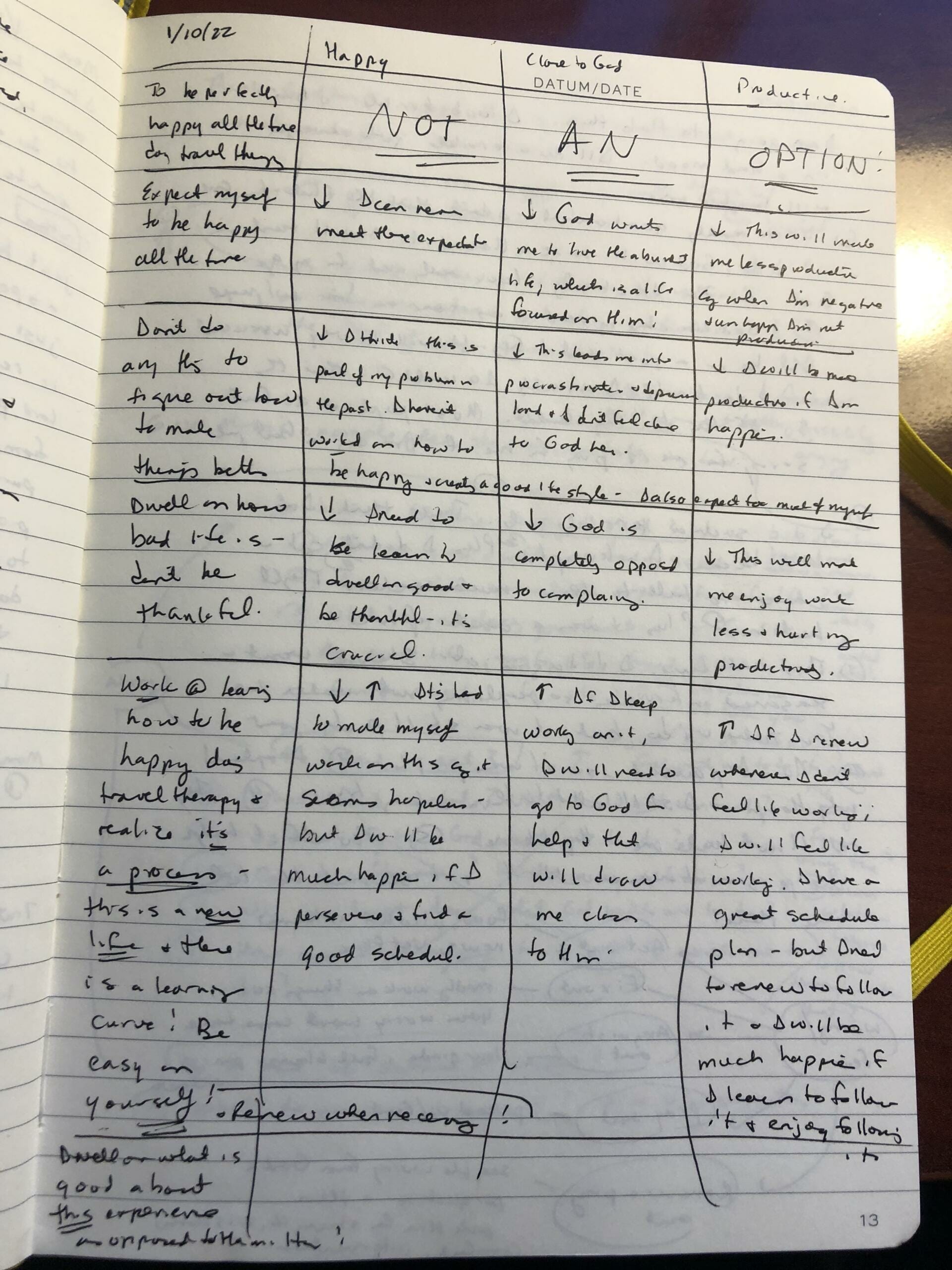Podcast: Play in new window | Download (Duration: 25:23 — 21.6MB) | Embed
Are you in the middle of a big life change? Or still adjusting to an old life change? Change can be difficult, even when it’s positive. Yet so many life changes don’t feel one bit positive. Here are just a few of the life changes we go through:
- A move
- Change of occupation: new job, loss of old job, career change, beginning college, etc.
- Engagement or marriage
- Divorce or separation
- Natural disasters and pandemics such as Covid
- Death of a loved one
- Serious illness, disease, or injury
- Children leaving home
- Retirement of yourself or a spouse
Since I’m experiencing my own life change at the moment (my husband just became a travel physical therapist and we’ve left our home of 30 years to travel around the country doing physical therapy and writing), I thought it might be helpful to do a podcast/blog post on how to navigate major life change. Following are a few things I’m trying as I enter this new season of life.
10 Tips to Navigate Life Change Well
- Recognize that it’s hard. So often we say things like, “I shouldn’t be feeling this way,” or “Buck up, Buttercup!” And while I’m a big fan of that latter phrase, it’s helpful to realize that it’s not surprising that we’re struggling. Even a happy occasion like marriage can cause adjustment problems. We’ll do better if we admit to ourselves that yes, this is an adjustment, and yes, it’s hard.
- Have realistic expectations for the process and give yourself grace. If you recognize it’s hard, you’ll be more likely to give yourself grace. Beating yourself up for not adjusting quickly enough isn’t helpful. I’ve found that if I have realistic expectations for how long something takes—whether it’s a task on my to-do list or an adjustment to a new situation—I’ll be less likely to get worried, depressed, or beat myself up.
- Work on making this new life the best life possible—put time and effort into it. Often, we complain about how hard life is, but we do nothing to change it. Instead, we expect it to get better over time. While this does sometimes happen, we’ll have much more success if we put some effort into making it better. The rest of these tips will give you ideas of how to make the best possible life.
- Brainstorm ideas to make life better. When you’re in a new situation, you’re not an expert at that situation. Instead, you need to learn how to be joyful in this new life. Take a list and brainstorm different ways to make it better. Talk to a friend, mentor, or loved one. Visit with someone who’s been in this situation to see how they handled it. Then circle a few things from the list to try.
- Join a support group or get involved in a community ASAP. When we moved to our first travel assignment in Santa Fe, the first thing we did was to find a church. We tried two churches in one day and found one we loved. We visited with people in the church, and I mentioned that it was hard to leave our community in Hamilton, Montana. This led to one couple inviting us to a home group and now we have instant community–a group of wonderful people to fellowship with. If your life change is traumatic, look for a support group in your area of others who are going through a similar trial.
- Dwell on the good. My tendency is to dwell on the good of the old life and the bad of the new life! This is not helpful! It’s easier to dwell on the good if you have a positive life change, but it can be incredibly difficult with a traumatic life change. That said, God can bring good from any situation. A bad situation is a perfect “opportunity” to develop a thankfulness habit, grow closer to God, and practice dwelling on the good.
- Lean on God and expect Him to teach you new lessons. Trusting God isn’t just a trite phrase. It’s an active event where we spend time with Him, time in His Word, time in prayer. The closer we get to God, the happier we’ll be. In fact, in some situations, this may be our only chance for happiness, at least in the beginning. Romans 5:3-5 and James 1:2-4 tell us that hard times are opportunities for growth. Our new pastor in Santa Fe said in a recent sermon that hard times can make us bitter, battered, or better. Leaning on God (rather than the way life used to be) will help them to be better.
- Recognize that you’ll have bad days. That said, expect to have bad days. It’s a process. One day you might think, I have this new life down pat! I can handle it now! And then the next day might be a disaster. That’s normal! It takes time to adjust to a new life. Don’t despair and don’t beat yourself up. Instead, trust that God will be by your side to help.
- Renew when upset. If I didn’t already have an established renewing habit, my current life would be much worse. As I write this post, we’re only three weeks into our new life. I went from being super depressed the first day here to being positive, hopeful, and excited about this life now. This happened through employing all the previous tips but this last tip was most helpful. Renewing is what helped me to see this experience from a biblical perspective, and more than anything, that’s what helped me be content. I’ll show you one of my renewing entries from the last few weeks below.
- Accept what you need to accept. Renewing helps, but often, you’re still left with an unpleasant truth. Your loved one is gone. You lost your job. The government is doing things you don’t like and they’re not asking you for permission. Accepting what we need to accept allows us to move on. It frees us up to pursue the best possible life within the context of what we can’t change. And it also frees us up to look for things—even in this life—to be thankful for. And we are far happy when we’re living in thankfulness.

My husband and I on top of Guadalupe Peak in Texas – we are immensely enjoying our current life change!
Renewing Example: Barb’s Journal Entry – 1/10/22
One of the ways I like to renew my mind is to make an option chart. When you hear the phrase option chart, you might think of a chart that explores all of our possible options. But a renewing option chart explores the options we’re currently taking to see how those options are affecting different outcomes we want: things like our relationship with God, our relationship with others, progress on a goal, or our personal wellbeing.
In the following chart, I’ve listed three things I want: to be happy in our new lifestyle, to feel close to God, and to be able to be productive in this lifestyle. To write and podcast and get other writing-related things done. I put those at the top of the chart and all of my tendencies on the left side of the chart.
I always start by writing down what I really want, which is always completely unrealistic. In this example, I wrote, “to be perfectly happy all the time during travel therapy.” Since I am NEVER completely happy all the time, even on vacation, it stands to reason I won’t be completely happy in this new life so I listed “NOT AN OPTION” on that line.
With all the other options, I listed an up or down arrow indicating how I thought that action would affect the outcome and then listed a reason I thought it would go that way. You’ll notice that my middle options almost always have a whole row of down arrows! Yet those are the options I consistently take if left to my own devices.
On the bottom row, I always list what I call the “God” option. I think about it for a bit and record what I think God would want me to do. Then I evaluate that option with arrows. And I almost always discover that God’s plan is best. Option charts help me have the strength to do what God wants me to do because they show me that God’s way really is best.
Following is a picture of my journal entry. Because it’s hard to fit charts in a blog post format, I thought it would be easier to just upload an image. I apologize in advance for my messy handwriting! At the time I wrote this, I had no idea I would be posting it on my blog!
This option chart completely changed my perspective. I’ve also done some truth journal entries that have helped. By making a commitment to regularly renew and also employ some of the other tips I mentioned, I’m able to celebrate and enjoy the good aspects of this experience and live a contented life.
God is good. We just need to go to Him for help to see that life is also good, especially when we’re having a hard time adjusting!
Have you gone through a big life change recently or in the past? I’d love any tips you have for me on how to adjust!
Resources Mentioned on the Podcast
- Skip Heitzig message on trials – Skip is just starting this series as I write this post, but by the time it publishes, you should be able to watch all the videos in the series.
- James Bible Study by Barb Raveling
- The 12-Week Year by Brian Moran and Michael Lennington
- How to Develop a Thankfulness Habit
How to Listen to the Podcast
- To listen or subscribe on Google Podcasts: click here
- To listen or subscribe on Apple Podcasts: click here
- To listen or subscribe on Android: click here
- To listen or subscribe on Stitcher: click here
- To listen or subscribe on Spotify: click here
- Amazon Alexa: To listen on Amazon Alexa, say, “Alexa, play the Christian Habits Podcast.”




Thanks for being such an encourager, Barb. I thank God for you kindred spirit. I really appreciate you!
Thanks for that encouragement, Debbie! Glad you’re enjoying the posts!